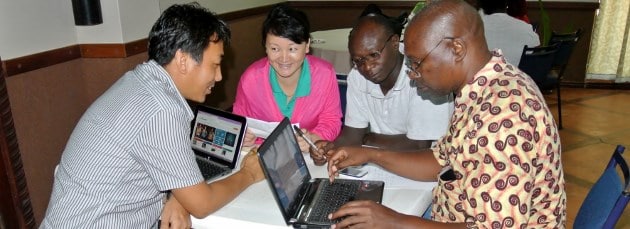Greening the Growth
30-05-13
With a growing global population of more than 7 billion people, Green Growth with a pro-poor focus becomes more than just a business idea; it is a most needed survival strategy. How do we satisfy the need for growth and development while ensuring a sustainable use of natural resources? That was the content of a Danida Fellowship Centre course during two weeks in Maputo in April 2013.
By Jan Kjær and Lene Mosegaard.
“The geographical and professional diversity of the group is an important aspect of this course since it facilitates the exchange of ideas and experiences from different realities and sectors,” says Henrik Borgtoft Pedersen.
He was the course manager for the Danida Fellowship Centre ‘Greening the Growth’- course held in Maputo Mozambique from the 8th to the 19th of April 2013. The course had 16 participants from Bhutan, Kenya, Mozambique, Vietnam, and Zambia representing a great variety of businesses, professions and positions.
“The course participants came from both the public sector and from private companies – a good mix for this type of course, as it sparked engaging discussions on how both sides could help promote green growth,” Henrik Borgtoft Pedersen says.
An urgent business
The 16 participants came to learn how to make growth processes resource-efficient, cleaner and more resilient without necessarily slowing them down. Green Growth means growing in a smarter way.
Green Growth has steadily moved up on the international agenda fuelled by the growing understanding that it may provide new opportunities for economic growth and increased employment in times where the global economy is facing strong challenges. Green Growth is important due to the general concern for the impact of climate change, over use of natural resources, increasing pollution and environmental degradation.
In many developing countries growth is gaining pace despite the world-wide crises. Cities are growing, new industries are mushrooming, energy demand is increasing dramatically and the need for agricultural produce is as high as ever. Huge investments in different types of development are made in the coming years by governments, private companies, citizens and donors.
To avoid wasting those investments on outdated and unsustainable technologies and practices, it is urgent to promote green growth in both the private and the public sectors.
From waste to branding
The 16 participants of the ‘Greening the Growth’ course in Maputo were presented with various experts and lecturers.
Among them, Stephen Forder from South Africa, who made presentations and exercises focusing on renewable energy, energy efficiency and green growth opportunities. He also facilitated discussions on green growth opportunities within water and waste sectors, including water efficiency, waste recycling, minimization and waste to energy aspects.
Asa Maria Tham, managing director of MozCarbon Lda, lectured on Business Development in the Green Growth Sector focusing on agro-processing and forestry sectors. She also presented lesson learned and recommendations for policy makers.
Mandi Smallhorne, South Africa Communication, conducted a session on communication and branding. The participants were introduced to news reports, press releases, brand management, and digital media in marketing and communication among them cell phones, blogging, social media like Facebook and Twitter. Press releases were made by the participants.
Course manager Henrik Borgtoft Pedersen introduced a.o. Environmental Management Systems in Small and Medium Sized Enterprises (SMEs). ‘’Waste does not exist’’ is one of his main points. There is no by product that cannot be turned into a valuable resource.
Greening the Growth course approach
The course aims at inspiring and motivating stakeholders from the private sector to focus more on Green Growth business areas. The course shows that consideration for the environment is not just a requirement from authorities; it holds opportunities for new business to develop and prosper, it may lead to saving opportunities in the production processes and it is fundamental to the development of a country.
This is achieved through a blend of training approaches, including lectures, group exercises and excursions. Focus is on challenging the participants to think in an innovative and creative way, identifying both new business areas and the possibilities to create synergies with other businesses for optimal use of resources e.g. in relation to energy and/or waste recycling.
Through the work with an individual business action plan the participants will plan for strengthening existing or pursuing new green growth activities in their organisation.
Outcome
The course, the first of its kind, is currently being evaluated at both response and impact level to gain important feedback to be used in enhancing such future programmes.
The course relevance was clearly validated by the commitment by and contribution from course participants – and the preliminary feedback points to areas where the programme will benefit by an overhaul and the strengths to build on.
The course was developed by DFC in cooperation with the Danish engineering consulting company NIRAS and the Eduardo Mondlane University in Maputo.
Subject to approval, the next course will be held in 2014.
For further information, please contact training adviser Lars Pedersen at lp@dfcentre.dk
What is NIRAS?
NIRAS is one of the largest engineering consulting companies in Denmark and has 1,300 employees. The company provides services within the fields of agriculture, forestry, environment, renewable energy, energy efficiency, and climate change, building and industry, civil works, management, social sciences and transport. NIRAS operates worldwide and has subsidiaries in a number of countries, including Kenya, Tanzania, Zambia and Mozambique. Further information at www.niras.com.
What is Eduardo Mondlane University?
The Eduardo Mondlane University in Maputo is the oldest and largest university in Mozambique. It has about 1600 academic members of staff and 27,000 students. Resources at the university include a research group on Renewable Energy with members from the Faculty of Engineering and Faculty of Science. Further information at www.uem.mz.

